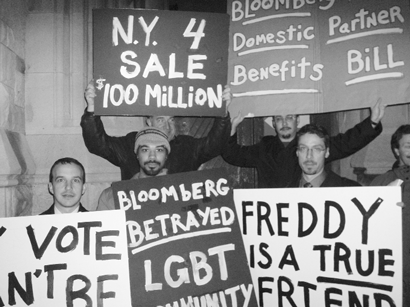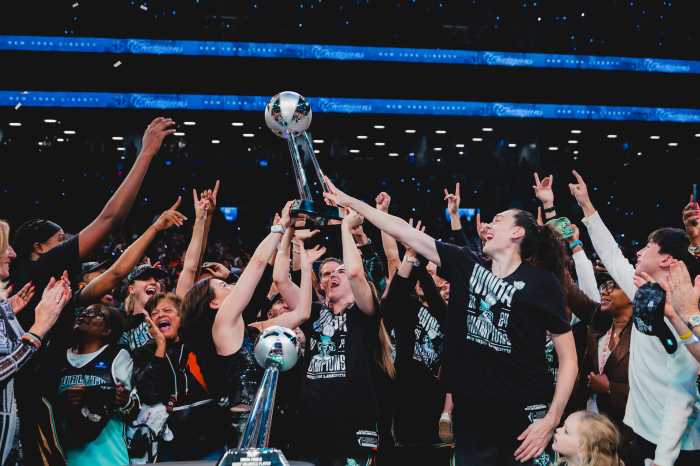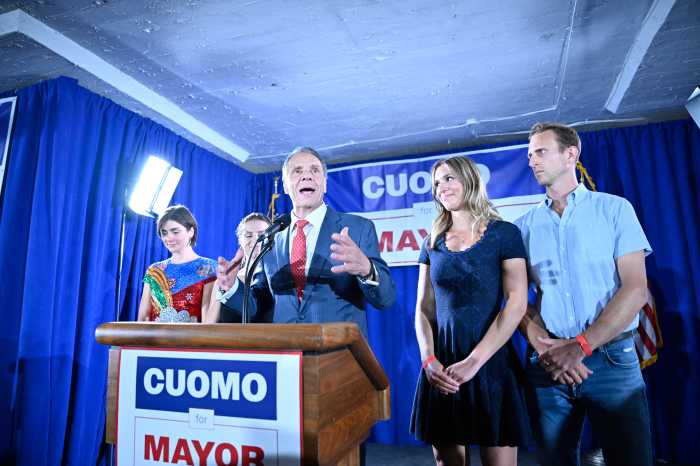Hanging with Brian Ellner at B Bar, jawboning insurers make for reelection strategy
Borrowing a page from the 2004 presidential campaign of George W. Bush, Mayor Michael R. Bloomberg has embarked on a charm offensive that presents him as comfortable with and supportive of the gay community even as he continues to oppose a February pro-gay state court marriage ruling and other key political goals sought by the community.
The Republican mayor appeared at the October 6 Empire State Pride Agenda fundraiser and an October 10 event held by the New York City chapter of Parents and Friends of Lesbians and Gays, or PFLAG.
On October 24, the Bloomberg campaign held an event for his queer supporters at the Maritime Hotel in Manhattan. That was followed by an October 25 dinner Bloomberg had with a few gay supporters at B Bar, a Bowery nightspot, on its gay night, Beige. The gossip page in the October 27 issue of the New York Post noted the B Bar event.
“It’s not just visibility,” said Brian Ellner, Bloomberg’s gay community outreach director and one of a number of Democrats who have endorsed Bloomberg, who attended the B-Bar dinner with his partner. “I think the mayor is making it clear to the community that he is supportive and wants to fight for equality. The mayor said it clearly in his speech when he said there is no such thing as almost equal.”
At the Maritime Hotel event, to which Ellner was referring, Bloomberg promised to release an updated AIDS curriculum for the city schools by December 1, to implement anti-bullying measures in city schools, and to aid homeless youth, including queer youth, if elected to a second term.
In 2003 and 2004, the Bush campaign and the White House went to some lengths to show the president as comfortable with gay people. In news articles and appearances, Bush was presented as having gay friends and even as he was announcing support for the Federal Marriage Amendment, a proposed change to the U.S. Constitution that would ban same-sex marriage, off-the-record background information given the media suggested that he was uncomfortable doing so and wished to make certain that homosexuals are treated respectfully.
Such a strategy can be used to reassure voters, straight and gay, who might be uncomfortable backing a candidate that they see as anti-gay.
Unlike Bush, whose support for the gay community is, at best, rhetorical, Bloomberg can point to real advances for the community that he has backed.
In 2002, Bloomberg signed city legislation that banned discrimination based on gender identity or expression, a law seen as protecting first and foremost transgendered people. This year he signed legislation that added “partnership status,” which was defined as “being in a domestic partnership,” to the city’s anti-discrimination law. Also in 2005, Bloomberg successfully lobbied four health insurance providers to make commercially available for the first time to small businesses in the city benefits policies with an option to add a domestic partner.
But Bloomberg has also opposed the community’s interests. While the mayor has said that he personally backs gay marriage, his administration is fighting the February ruling from a New York state court that required the city to issue marriage licenses to gay and lesbian couples. The Bloomberg administration has refused to implement the Dignity in All Schools Act, an anti-bullying bill that includes protections based on sexual orientation and gender identity, and it filed s court challenge—to date, successful—against the Equal Benefits Bill, a local law that requires businesses holding contracts worth $100,000 or more with the city to offer the same benefits to the domestic partners of their employees as are offered to the spouses of their employees.
Bloomberg, who clearly wants an overwhelming win in the November 8 mayoral race, could be making his recent string of gay community appearances to counter any perception that he is anti-gay. Ellner, who recently lost his Democratic primary bid for Manhattan borough president, said that was not the case.
“It was in concert with significant, substantive initiatives,” he said of the Maritime Hotel event. “It is a campaign and he is reaching out to every community in New York City as I imagine Freddy Ferrer is.”
Ferrer supporters, such as Doug Robinson, co-president of the Out People of Color Political Action Club, do not see the Bloomberg efforts as sincere.
“In a city of progressives, where more people think that our relationships should be honored and respected, he cannot be seen as a homophobe,” Robinson said, explaining what he thinks the mayor is up to. “He cannot be seen as not embracing the family mosaic of the city.”
Robinson said that while such a strategy might win some votes, among progressive and gay voters it would not be successful.
“He’s trying to solidify his vote in the LGBT community, but it’s not enough and it’s too late,” Robinson said. “He has already set a record. He doesn’t support our marriages, he doesn’t support out children in schools, and he doesn’t support our rights for equal benefits for equal pay.”
Gary Parker, president of the Lambda Independent Democrats, a Brooklyn political group, shared Robinson’s view.
“He is using these appearances to create the perception that he is an advocate and ally of the community,” Parker said. “It demonstrates how powerful that vote is and it’s unfortunate that many in the LGBT community don’t fully understand the nuances of his spin. They end walking away with the same misconceptions that Brian Ellner has.”
gaycitynews.com


































